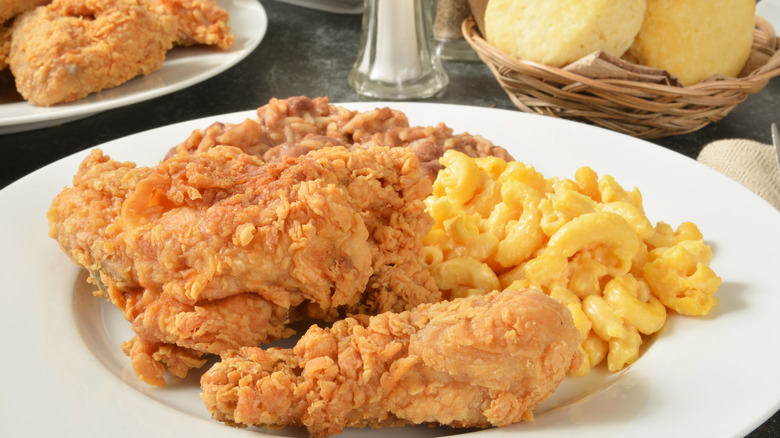The Unexpected Scottish Origins Of Fried Chicken
Padma Lakshmi, cookbook author and host of the reality TV cooking show "Top Chef," may have made the most eloquent confession of faith in the spiritual nature of fried chicken when she said, "In a way that somebody else converts to Judaism or becomes a Hare Krishna, I belong to the church of fried chicken," according to a recent BBC story. She is, of course, not alone in that sentiment. According to the BBC, freelance writer and Southern cooking expert Damon Lee Fowler, in his 1998 book "Fried Chicken: The World's Best Recipes from Memphis to Milan, from Buffalo to Bangkok," suggested that fried chicken is the state religion of the southern United States.
Fowler is in part referencing the role that fried chicken plays in the Black church, where it is often a centerpiece of church life. Soul food expert and author of the BBC piece Adrian Miller, a James Beard Award winner, explained at All Recipes that in the 19th century, it took time to prepare fried chicken. It was a labor-intensive process, from catching and killing a chicken to gutting it to cutting it into pieces before finally frying it, all of which made fried chicken a "special-occasion food, and for most African Americans, special occasions were communal meals connected to their church," Miller explained.
Other spiritual — and Scottish — origins of fried chicken
But long before the Black church, fried chicken had spiritual status. According to Miller in First We Feast, sometime after 7,500 B.C., the wildfowl that would become the chicken was domesticated in Southeast Asia, where it was revered for crowing to announce the sunrise. But as chickens were traded across the world, they became valued as food, and accounts of frying them — though not the same way as today — began to emerge. Interestingly, there are two historical paths, details lost to the dim mists of time, explaining how fried chicken arrived in the United States.
Miller's All Recipes piece suggests a path starting in West Africa, where people had long been frying chicken and continued to do so after they were forced into slavery in the United States. A second path, noted in the BBC story, has fried chicken arriving in the United States through Scottish settlers, based in part on a 1773 entry by Scottish diarist, James Boswell, describing a fried chicken dinner. In Wide Open Eats, food writer John Mariani suggests that the Scottish pan-frying of chicken "was very well adapted to the plantation life of the southern African-American slaves." Miller posits in the BBC article that the paths merged as slaves began using fried chicken recipes of Scottish natives who became American slaveholders. In time, Miller wrote, "African American cooks embraced it [the Scottish recipes] as part of their own culinary tradition," which "caused fried chicken to lose its Scottish identity."

